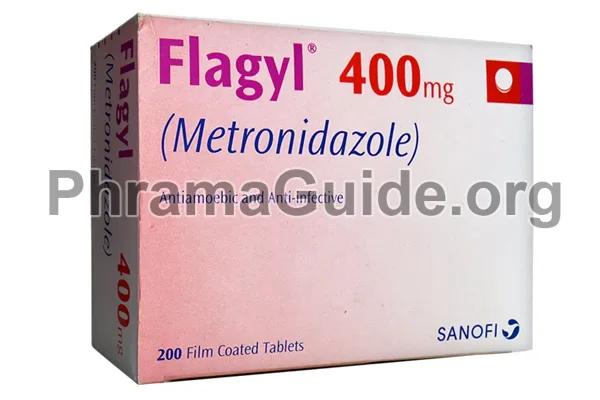Flagyl is an antibiotic that is used to treat bacterial and protozoal infections. Primarily, Flagyl tablets are used to treat infections in the gastrointestinal tract, urinary tract, and the infection of the bloodstream. Flagyl tablet helps to eradicate anaerobic bacteria, which are those that do not need oxygen to survive. Following are some common and off-label uses of Flagyl tablets:
Common Uses of Flagyl Tablet
- Bacterial Infections: Flagyl tablet is used to treat infections caused by certain types of bacteria, such as Helicobacter pylori, which can cause stomach ulcers, and Clostridium difficile, which can cause diarrhea.
- Protozoal Infections: Flagyl tablet is used to treat infections caused by certain types of parasites, such as Trichomonas vaginalis, which can cause vaginal infections, and Giardia lamblia, which can cause diarrhea.
- Dental Infections: Flagyl tablet is sometimes used in combination with other antibiotics to treat dental infections, such as periodontal disease and abscesses.
- Skin and Soft Tissue Infections: Flagyl tablet is also used to treat skin and soft tissue infections caused by anaerobic bacteria.
- Sexually Transmitted Infections: Flagyl tablets may be used to treat some sexually transmitted infections (STIs), such as trichomoniasis and bacterial vaginosis.
Flagyl Tablet Off-label Uses
- Inflammatory Bowel Disease (IBD): Flagyl tablets may be used as an adjunctive treatment in some cases of Crohn’s disease and ulcerative colitis, which are types of inflammatory bowel disease. It’s believed to have anti-inflammatory properties.
- Diverticulitis: Flagyl tablets may be used in combination with other antibiotics to treat diverticulitis, an inflammation or infection of small pouches (diverticula) that form in the lining of the intestine.
- Periodontal Disease: Flagyl tablets may be used in some cases as an adjunctive treatment for periodontal disease (gum disease) when other antibiotics are not effective.
- Brain Abscess: Flagyl tablets may be used in combination with other antibiotics to treat brain abscesses, which are localized collections of pus within the brain tissue.
- Pelvic Inflammatory Disease (PID): In some cases, Flagyl tablets may be part of the treatment regimen for PID, an infection of the female reproductive organs.
- Mastitis: Flagyl tablets may be used in combination with other antibiotics to treat mastitis, an infection of the breast tissue, in breastfeeding mothers.
Do not stop using Flagyl tablet without discussing it with your doctor first even if you do not feel better after several days. This medication usually needs to be used for longer periods in order to effectively clear up an infection entirely.

What is Flagyl?
Flagyl is one of the leading brands of Metronidazole, manufactured and marketed by Sanofi Aventis (Pakistan) Ltd.
Flagyl Alternatives : Other Similar Brands
The following are some alternative brands of Flagyl and their manufacturers.
- Metrozine : Searle Pakistan (Pvt) Ltd.
- Klint : Sami Pharmaceuticals (Pvt) Ltd, Pakistan.
- Riam : Stanley Pharmaceuticals (Pvt) Ltd, Pakistan.
- Gramex : Platinum Pharmaceuticals (Pvt) Ltd, Pakistan
- Abozole : Abbott Laboratories (Pakistan) Ltd.
- Metni V : Shaigan Pharmaceuticals (Pvt) Ltd, Pakistan.
- Metrida : Zafa Pharmaceutical Laboratories (Pvt) Ltd, Pakistan.
- Neometin : Genom Pharmaceuticals (Pvt) Ltd, Pakistan.
- Amezole : Ferozsons Laboratories Ltd. Pakistan.
- Danizol : Don Valley Pharmaceuticals (Pvt) Ltd, Pakistan.
- Flezole : Pearl Pharmaceuticals, Pakistan.
Flagyl: Available Formulations and Strengths
Presently, Flagyl is available in Tablets, Syrup, and Infusion forms.
Flagyl Tablet : 200mg and 400mg strengths.
Flagyl Syrup (60ml) : 200mg/5ml strength.
Flagyl Infusion : 500mg/100ml strength.
Who Should Not Use Flagyl?
Flagyl tablets can be an effective treatment, but there are some contraindications associated with it.
- Allergy or hypersensitivity: Flagyl should not be used by people who are allergic to Flagyl or any of its ingredients.
- Pregnancy: Flagyl should be used with caution during pregnancy, especially during the first trimester, as it may increase the risk of birth defects.
- Breastfeeding: Flagyl can pass into breast milk and may harm a nursing baby that’s why it should be avoided to used by a nursing mother.
- Blood disorders: Flagyl can affect blood cells, so it should not be used by people with blood disorders, such as anemia or leukopenia.
- Liver disease: Flagyl can be harmful to people with liver disease, so it should be used with caution or avoided altogether in these cases.
- Alcohol consumption: Flagyl can cause a severe reaction when combined with alcohol, including symptoms such as headache, flushing, and nausea. It’s important to avoid consuming alcohol while taking Flagyl and for at least 48 hours after finishing the course of treatment.
What is the Recommended Daily Dosage of Flagyl?
Flagyl Tablet Dose for Bacterial Infections (Adults):
- 1 – 2 tablets of 400mg, every 8 hours for 7 to 10 days.
- In some cases, a higher initial dose followed by lower maintenance doses may be prescribed.
Flagyl Tablet Dose for Protozoal Infections (Adults):
- 2 grams (5 tablets of 400mg) as a single dose.
- Or one tablet of 200mg, three times a day for 7 days.
Flagyl Tablet Dose for Conditions like Giardiasis or Trichomoniasis:
- 2 grams (5 tablets of 400mg) as a single dose.
- Or one tablet of 200mg, three times a day for 7 days.
Flagyl Tablet Dose for Bacterial Vaginosis (Adults):
- One tablet of 400mg, twice daily for 7 days.
Flagyl Tablet Dose for Helicobacter pylori Infection (Adults):
- 1 – 2 tablets of 400mg twice daily for 7 days, along with other antibiotics.
How Flagyl Works?
Flagyl belongs to the nitroimidazole class of antibiotics, it can interact with the DNA of the microorganism. Binding to DNA causes strand breaks and cross-linking of DNA molecules. This disrupts the normal structure and function of DNA, ultimately inhibiting the replication and transcription processes necessary for the survival and growth of the microorganism.

Leave A Comment